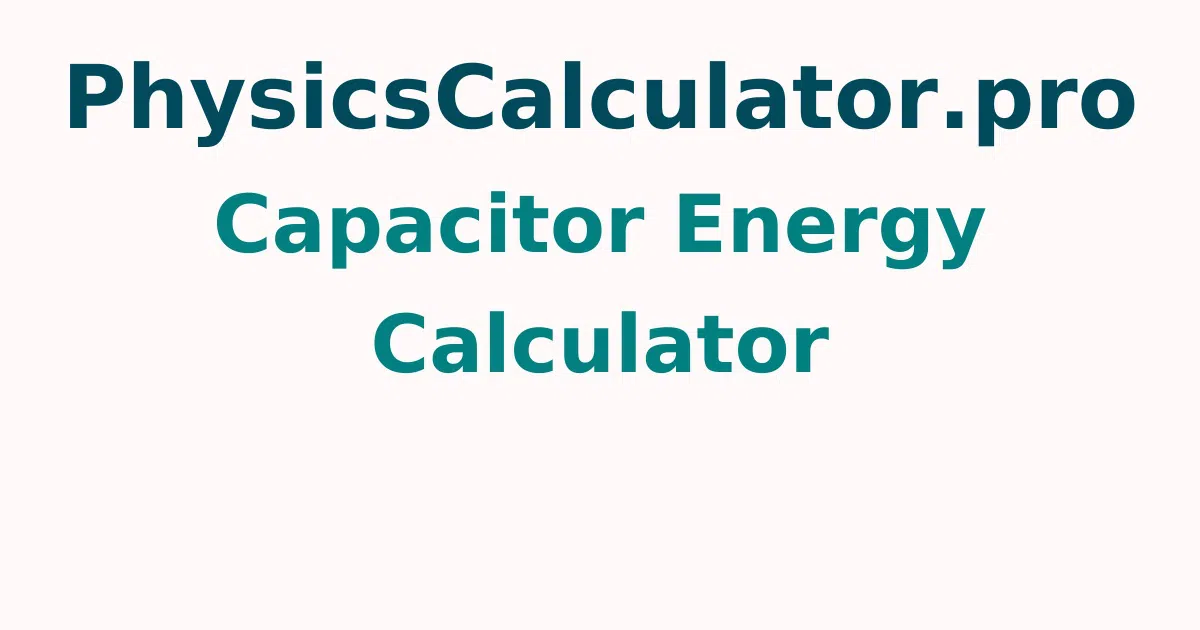Capacitor Energy Calculator
The Capacitor Energy Calculator is a simple tool that quickly determines the amount of energy stored in a capacitor. To acquire the Energy Stored in a Capacitor in a fraction of a second, simply enter the values charge or capacitance, the applied voltage in the input box and click the calculate button.
What is Energy Stored in a Capacitor?
A capacitor is a regularly used electrical component in circuits. Its purpose is to store a charge of electricity. Charges of equal but opposite value exist on adjacent plates in traditional parallel plate capacitors (for a spherical capacitor there are concentric spheres instead of plates).
These charges generate an electric field between them, which is made up of a portion of the energy circuit. This is an example of potential energy because we're talking about charged particles. The conventional potential energy formula, however, will not work in this circumstance.
Capacitor Energy Formula
The equation E = 1/2 x C x V^2 can be used to estimate the energy E stored in a capacitor with capacitance C and applied voltage. This equation may be written using the basic capacitance formula C = Q x V to obtain the other comparable capacitance equation E = 1/2 x Q^2/C or E = 1/2 x Q x V
Applications of Capacitor Energy
Here are a few examples of how capacitor energy can be used
- A defibrillator administers a large shock to a person's heart in a short burst to rectify an irregular heart rhythm. Large electric current shocks can be used to interrupt the arrhythmia and allow the body's natural pacemaker to return to its regular rhythm. The energy stored in the capacitor is used by a defibrillator.
- The energy held in the capacitors is used by audio equipment, uninterruptible power sources, camera flashes, and pulsed loads such as magnetic coils and lasers.
- Supercapacitors can store a vast quantity of energy and perhaps open up new technological possibilities.
How to use the Capacitor Energy Calculator?
The process for using the Capacitor Energy Calculator is as follows
- Step 1: Fill in the appropriate input fields with the charge, applied voltage, and "x" for the unknown value.
- Step 2: Select the "Calculate the Unknown" option to calculate the Capacitor Energy.
- Step 3: Finally, the Capacitor Energy of a selected item will be displayed in the output field.
For more concepts check out physicscalculatorpro.com to get quick answers by using this free tool.
Examples of Capacitor Energy
Question 1: Calculate the energy stored in a capacitor with a capacitance of 60 F and a voltage of 100 V.
Solution:
A capacitor with a capacitance of 60 F is charged to a voltage of 100 V. The capacitor's stored energy can be calculated as follows
E = 1/2 x C x V^2
E = 1/2 x 60 x 100^2
= 300 x10^3 J
Question 2: Calculate the energy stored in a capacitor with a capacitance of 60 F and a voltage of 150 V
Solution:
A capacitor with a capacitance of 60 F is charged to a voltage of 150 V. The capacitor's stored energy can be calculated as follows
E = 1/2 x C x V^2
E = 1/2 x 60 x 150^2
= 675 x10^3 J
FAQs on Capacitor Energy Calculator
1. How long does a capacitor store energy?
In a process that lasts roughly 1 millisecond, the energy from the capacitor is transformed into a burst of light. It takes some time for the capacitor to recharge after the flash has been utilised before the next shot can be taken.
2. Calculate how much energy a capacitor consumes?
The formula for capacitor energy E = 1/2 x C x V^2
3. What is the purpose of the energy held in a capacitor?
Capacitors provide energy to a wide range of devices, including defibrillators, microelectronics like calculators, and flashbulbs. The labour required to charge a capacitor, starting with no charge on its plates, is the energy stored in the capacitor.
4. Is it possible to hold charge or energy in a capacitor?
Capacitors don't hold a charge, but they do store energy.
5. How can you find out how much work a capacitor does?
A Charged Capacitor Stores Energy q=CV. We know that W = V q, implying that work done equals the product of potential and charge.
